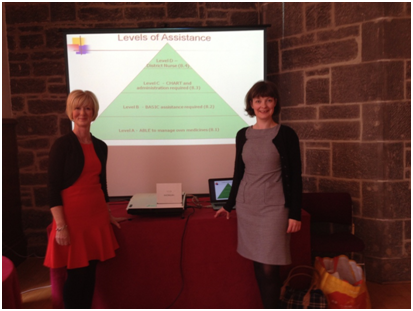
George,
NHS Lanarkshire Medication Management Services work with North & South Lanarkshire Health & Social Care Partnerships’ Care at Home Services, to support people to be cared for in their own home.
We aim to provide safe, person-centred, effective care for all Lanarkshire residents, so that people are able to look after and improve their own health and wellbeing and live in good health for longer. This achieves many of the 9 National Outcomes for Health and Wellbeing and achieves goals that patients often set themselves.
Many people living with long term conditions tell us their main goal is to remain at home and to reduce or avoid admission to hospital.
To keep people safe with medication, it is important to identify the nature of any medication support that is required, and also identify the most appropriate support for their individual needs. We have created an assessment process and work with and train assessor staff to assess a person’s requirement for medication support, in discussion with the person and their family. These assessors include Care at Home assessors, nurses, physiotherapists, occupational therapists and social work staff.
Jaqueline Kelland & Ruth Campbell delivering training
We have also developed Medicines Management training for Care at Home providers, and we train Care at Home staff who are then able to support people to manage their condition with medicines and live well at home safely.
Level A – ABLE to manage their own medication
Many people are able to manage their medication independently, or with family/friend support and we encourage this self-management of medication to continue where possible and safe.
Level B – BASIC assistance
Some people just need a little help to carry out their own decisions in relation to medication; Care at Home staff can offer this support safely. Staff are trained to provide this minimal medication support in a safe way, allowing the person to keep control of their own medication and decisions around it while helping with any identified needs according to an agreed plan of care.
Level C – CHART and administration service
For those people who need more help with their medication, Care at Home staff are trained to administer and record medicines that have been taken or used. This allows medicines reconciliation by any member of the health and social care team know exactly what medicines have been used. This helps ensure that the correct treatment or admission to hospital can be agreed and arranged quickly.
We also work with many other health and social colleagues in the community and in hospitals to help join up all aspects of medication support for people who receive Care at Home services, helping keep systems as safe as possible and maximising communication between the various health and social care services.
Medicines Management is a flexible system of care, helping people to remain independent where possible by identifying the current level of medication support requirement, and tailoring any medication support to their individual needs, with the reassurance that this level can be reassessed as a person’s medication support needs change.
If you have an experience of Medication Management Services you would like to share, please speak to a member of staff, respond on Care Opinion, or visit the “Your Feedback” Section of the NHS Lanarkshire website to see the other ways to get in touch www.nhslanarkshire.org.uk
We are listening - helping people to remain at home
We are listening - helping people to remain at home https://www.careopinion.org.uk/resources/blog-resources/23-images/ba867a453c134cc1a278ca9af3013d2a.png Care Opinion 0114 281 6256 https://www.careopinion.org.uk /content/uk/logos/co-header-logo-2020-default.pngUpdate from NHS Lanarkshire
Posted by George Lindsay, Chief Pharmacist, Primary Care, NHSL Headquarters, NHS Lanarkshire, on
About: NHS Lanarkshire
Response from 9 on 16 Dec 2017 at 09:29
How do people organise that PRN medication is given such as pain relief or eye drops? My mother had to take oramorph 2 hourly when she became quite unwell over the past few weeks. She was not able to draw up this medicine herself and it would seem that there was no service in place apart from family members taking time off work continuously in order to provide some level of pain control. I asked for this to be changed to longer acting pain relief but was advised that this was faster acting. I had various discussions with carers coming into the house and it would seem that this is not an isolated incident. The statement made above sounds good and uses all the correct buzz words from a strategic point of view but the reality is that the service provided is very limited and at times completely inadequate. It may be that the people with whom we spoke (hospital at home being involved) are not aware of How to manage this and if so then there is a training issue. At no point in time was any of my mother’s medication written up by any member of any team in order that she be given medication, matrifen patches being one that needed to be changed every 3 days. I have already contacted various services re my mothers care but having spoken to a number of people now who have come across the same problem as myself re medication I felt that you should also be aware of problems. I hear that carers have to rely on next door neighbors to insert eye drops. Do you think this is ideal?
Response from George Lindsay, Chief Pharmacist, Primary Care, NHSL Headquarters, NHS Lanarkshire on 22 Dec 2017 at 13:54
Thank you for your comments which illustrate your experience. You identify a number of issues which we acknowledge and, in a constructive manner, you pose some challenges for us to seek improvement.
We would like to understand the issues in greater depth and would appreciate if you could contact us, off line, so that we can learn further from your experience.
You can contact me by e-mail George.lindsay@lanarkshire.scot.nhs.uk or by Telephone on: 01698 858128
Regards.


